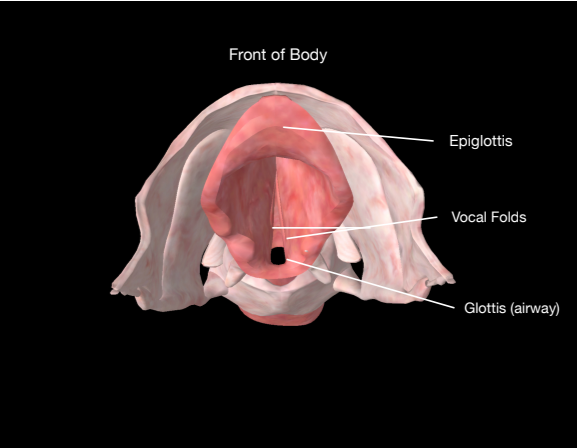Vocal Health: Myths and Truths
When caring for vocal fatigue or disfunction, you will find many differing opinions on what remedy is best. In the studio, I often see singers with tired instruments come to lessons with tea, peppermint oil, cough drops/ lozenges, even a shot of olive oil, but are any of these home remedies an effective solution? The most important information to consider when taking an agent to soothe soreness or fatigue is that nothing taken orally will touch the vocal folds. The epiglottis (figure 1) acts as a cover to the vocal folds during swallowing, ensuring that no food or liquid goes down the trachea (windpipe) which would lead to choking. If the experienced soreness or fatigue is occurring at the vocal fold level, nothing ingested will provide a solution. However, there are steps that can be taken to aid in recovery.
Hydration
Figure 1
While drinking water or tea during singing practice may help with dry mouth, some research suggests that it takes approximately two hours for water to be distributed from the kidneys to the vocal folds. It is common to hear that swallowing certain things will “clear” the vocal folds. This, of course, is inaccurate given the function of the epiglottis (as stated above). The effect hydration has on the singing voice is not fully understood, but there is enough evidence to suggest that maintaining hydration can provide some protection to the mucosal layer and help to maintain appropriate mucosal viscosity (Rosenberg & LeBorgne 386). Additionally, singers who suffer from “gunk” or mucus on the folds may experience some relief from maintaining proper hydration. How much water is enough? The exact amount of water needed to achieve adequate hydration will vary depending on individual physical needs, humidity, activity level, and elevation. The color of your urine is a good indicator of hydration; a darker color indicating lack of hydration while a lighter color suggests a well hydrated system.
Personal steam inhalers and/or nebulizers are an option for singers who prefer external air humidification. Below is a comparison of steamers vs. nebulizers (figure 2). These devices should not replace drinking fluids but should instead be seen as a “spa for the vocal folds” providing a temporary plumping and/or hydrating effect.
Figure 2
Rest
Voice professionals believe that resting the voice will allow healing to happen faster than during phonation. Consider how you would heal an external physical injury- a doctor may prescribe ice, elevation, and, above all, rest! For the singer this would include limiting talking and singing during times of fatigue or expected periods of heightened use. Getting an adequate night’s sleep is important for physical function including that of the vocal folds. They are part of us and experience swelling, irritation, and fatigue just like the rest of our body. If you got a poor nights sleep, your vocal folds did, too!
Oral Remedies
If you are sick and/or have a “sore throat” there are oral remedies that may soothe the vocal tract. Below are a few of the most commonly used solutions.
Lemon: Lemon has a low pH and therefore is considered by some to be an antibacterial component. There have not be extensive studies on the impact of lemon on vocal health.
Honey: There have been clinical studies demonstrating the antibacterial and anti- inflammatory effects of honey. While these effects have not been specifically applied to the voice, honey has shown to be a cough suppressant (Rosenberg & LeBorgne 383). You may choose to add 2 honey to a warm (not hot) beverage or take a tablespoon of honey raw.
Gargle: a salt and water gargle has long been used as a remedy for sore throat. A salt water gargle may help to reduce inflammation. Dr. Gould’s gargle recipe has long been used by singers. The salt and baking soda are thought to have antibacterial properties while the honey acts to coat and soothe the throat.
Gould's Gargle Ingredients:
Half tsp salt
Half tsp baking soda
Half tbsp. Honey
6 oz warm water
Mix all ingredients and gargle in small amounts for two minutes. Do not eat or drink for 15 minutes after gargling. Use to relive dry/scratchy and/or sore throat. Gargles are meant to be spit out. Do not ingest.
Throat Coat Tea: A 2003 study assed the benefit of Throat Coat Tea (containing slippery elm) on swallowing. The study concluded that patients who received 5-6oz of Throat Coat Tea 4-6 times daily experienced rapid, temporary relief of sore throat pain when compared to the placebo (Brinckmann, J. Sigwart, H. van Houten, Taylor L. n.pag). Slippery Elm is the real hero of Throat Coat Tea when it comes to providing relief. If you prefer an alternate option Slippery Elm lozenges will have a similar effect.
Antihistamines/ Anti Inflammatories/ Decongestants: Anti Inflammatories should not be used to treat vocal fold swelling as there is an increased risk of bleeding. Antihistamines and decongestants are drying and should be counteracted with an increased water intake. Consult a medical professional before taking medication to treat the voice.
Consulting a doctor
We cannot hear or feel pathology (i.e. nodules, polyps, dysphonia, vocal cord paralysis) in the voice. Your voice teacher may refer you to a specialist if you are experiencing symptoms such as persistent vocal fatigue unrelated to external factors, a raspy vocal quality, or experiencing If you’re curious about your vocal health, you might consider getting a laryngoscopy to establish a baseline. This is a simple, pain free, procedure where a camera is inserted into the mouth or nose allowing a doctor to see your vocal folds. Medical professionals are able to see vocal pathologies through this process.
Summary
The most effective remedies for most vocal ailments is hydration and rest. If you are experiencing vocal discomfort from cold or flu like symptoms, there are homeopathic remedies that you may find effective. No homeopathic remedy will cure vocal fatigue or a pathology. It is not possible to hear or feel a pathology. If you are concerned about your vocal health, it is best to speak to a medical professional.
Written by Emily Gregonis
Resources
Brinckmann J;Sigwart H;van Houten Taylor L; “Safety and Efficacy of a Traditional Herbal Medicine (Throat Coat) in Symptomatic Temporary Relief of Pain in Patients with Acute Pharyngitis: A Multicenter, Prospective, Randomized, Double-Blinded, Placebo-Controlled Study.” Journal of alternative and complementary medicine (New York, N.Y.). Accessed August 14, 2025. https://pubmed.ncbi.nlm.nih.gov/12804082/.
“For the Professional Voice.” ColumbiaDoctors, June 20, 2024. https://www.columbiadoctors.org/specialties/ear-nose-throat/our-services/voice-swallowing-breathing-disorders/professional-voice.Ishikawa, Keiko, and Susan Thibeault. “Voice Rest versus Exercise: A Review of the Literature.” Journal of voice : official journal of the Voice Foundation, July 2010. https://pmc.ncbi.nlm.nih.gov/articles/PMC2925639/.
Rosenberg, Marci Daniels, and Wendy DeLeo LeBorgne. The vocal athlete: Application and technique for the hybrid singer. San Diego, CA: Plural Publishing, 2026.


